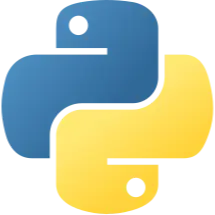Who is this for?
This crash-course makes the assumption that you already have some programming experience, but perhaps none with Python.
Comments
# You can write a comment using an octothorpe or 'hash' symbol
Printing to terminal
print("Hello World!")
Hello World!
Variables and assignment
my_number = 5
my_float = 0.2
my_string = "Hello"
also_my_string = "Hello"
print("{} is of {}".format(my_number, type(my_number)))
print("{} is of {}".format(my_float, type(my_float)))
print("{} is of {}".format(my_string, type(my_string)))
print("{} is of {}".format(also_my_string, type(also_my_string)))
5 is of0.2 is of Hello is of Hello is of
Terminal input
my_result = input("please enter a word: ")
print("result: {}".format(my_result))
please enter a word: hello world
result: hello world
Mathematical operations
my_result = 5 + 2 # add
print("resulat: {}".format(my_result))
result: 7
my_result = 5 - 2 # substract
print("result: {}".format(my_result))
result: 3
my_result = 5 * 2 # multiply
print("result: {}".format(my_result))
result: 10
my_result = 5 / 2 # divide
print("result: {}".format(my_result))
result: 2.5
my_result = 5 % 2 # modulo
print("result: {}".format(my_result))
result: 1
my_result = 5 ** 5 # exponent
print("result: {}".format(my_result))
result: 3125
Boolean operations
my_result = True
print("result: {}".format(my_result))
my_result = False
print("result: {}".format(my_result))
result: True result: False
And operator
my_result = False and False
print("result: {}".format(my_result))
my_result = False and True
print("result: {}".format(my_result))
my_result = True and False
print("result: {}".format(my_result))
my_result = True and True
print("result: {}".format(my_result))
result: False result: False result: False result: True
Or operator
my_result = False or False
print("result: {}".format(my_result))
my_result = False or True
print("result: {}".format(my_result))
my_result = True or False
print("result: {}".format(my_result))
my_result = True or True
print("result: {}".format(my_result))
result: False result: True result: True result: True
Not operator
my_result = not True
print("result: {}".format(my_result))
my_result = not False
print("result: {}".format(my_result))
result: False result: True
Relational operations
my_result = 5 > 2 # greater than
print("result: {}".format(my_result))
my_result = 5 >= 2 # greater than or equal to
print("result: {}".format(my_result))
my_result = 5 < 2 # less than
print("result: {}".format(my_result))
my_result = 5 <= 2 # less than or equal to
print("result: {}".format(my_result))
my_result = 5 == 2 # equal to
print("result: {}".format(my_result))
result: True result: True result: False result: False result: False
Conditional statements
age = 17
uk_drinking_age = 18
if age >= uk_drinking_age: # IF
print("you can drinking!")
elif age == 17: # ELSE IF
print("you can drink on your birthday!")
else: # ELSE
print("you can't drink!")
you can drink on your birthday!
Data structures
List
shopping_list = ["Carrots", "Onions", "Chicken", "Coconuts"]
print(shopping_list)
print(shopping_list[0]) # Python is zero-indexed
shopping_list.append("Ice cream")
print(shopping_list)
['Carrots', 'Onions', 'Chicken', 'Coconuts'] Carrots ['Carrots', 'Onions', 'Chicken', 'Coconuts', 'Ice cream']
Dictionary
shopping_list = {"Carrots": 5, "Onions": 2, "Chicken": 1, "Coconuts": 1}
print(shopping_list)
print("Careful - dictionaries are not ordered in older versions of Python.")
print(shopping_list["Carrots"])
{'Carrots': 5, 'Onions': 2, 'Chicken': 1, 'Coconuts': 1}
Careful - dictionaries are not ordered in older versions of Python.
5
Tuple
my_result = (5, 6)
print(my_result)
my_result = (5, "hello", 5.5, True, 2)
print(my_result)
(5, 6) (5, 'hello', 5.5, True, 2)
Loops
For
shopping_list = ["Carrots", "Onions", "Chicken", "Coconuts"]
for item in shopping_list:
print(item)
Carrots Onions Chicken Coconuts
for index in range(0,10):
print(index)
0 1 2 3 4 5 6 7 8 9
While
number = 0
while(number < 18):
print(number)
number += 1
print("number was no longer below 18!")
0 1 2 3 4 5 6 7 8 9 10 11 12 13 14 15 16 17 number was no longer below 18!
Functions
def my_function(): # create a function
print("No parameter arguments passed in")
my_function() # call a function
No parameters passed in
def another_function(name):
print("Parameter arguments passed in: {}".format(name))
another_function("Derek")
Parameter passed in: Derek
def greater_than(left_operand, right_operand):
my_result = left_operand > right_operand
return my_result # returning a value from the function
print(greater_than(5, 2)) # printing the value returned from the function
True
Packages
import datetime
print(datetime.datetime.now())
2023-02-12 07:34:40.130861

